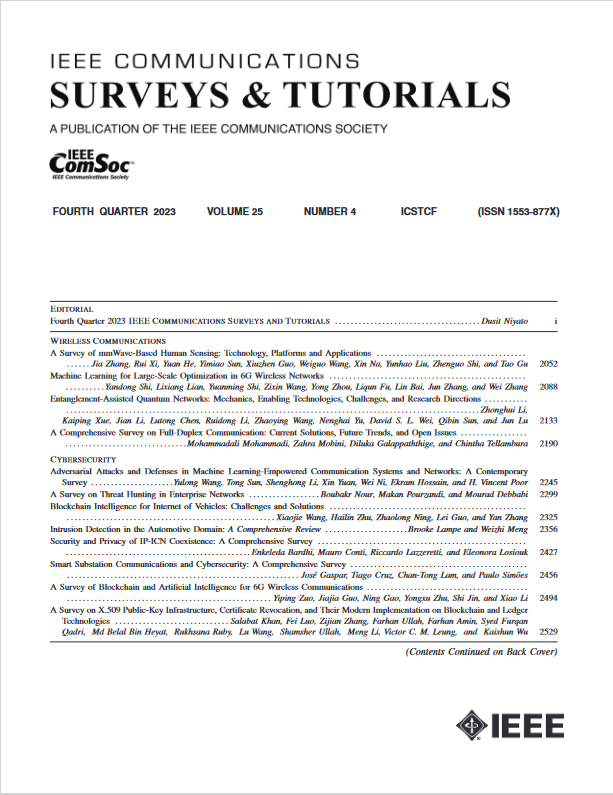Optimal Control and Communication Strategies in Multi-Energy Generation Grid
IF 34.4
1区 计算机科学
Q1 COMPUTER SCIENCE, INFORMATION SYSTEMS
引用次数: 0
Abstract
Multi-energy generation grids (MEGGs) provide a promising solution for reliable operations of cooperative various distributed energy resources (DERs), supply environmentally friendly energy to remote/off-grid areas, and improve overall system performance in terms of efficiency, reliability, flexibility, and resiliency. However, with the penetration of grids and the presence of various DERs with unpredictable renewables-based power generation and intermittent power loads, the operational coordination and supervision tasks become more complex. The communication-based optimal distributed control approach plays a significant role in MEGGs for coordinating an assembly of spatially and heterogeneous DERs, which improves reliability, efficiency, scalability, robustness, and privacy-preserving compared with traditional centralized-based controls. Therefore, this article aims to study different grid architectures and provide a comprehensive survey of optimal control and communication strategies/systems (CCS) in MEGG. A well-organized and systematic discussion related to the topic has been provided and elaborated on: 1) energy production and distribution with various grid architectures and distributed generating units (DGUs) integration for sustainable power generation, importance of unit sizing and technologies selection, and their implementations and operations; 2) classification on numerous control architectures and techniques, their prominent features and impact on MEGG stability; 3) multiple advanced intelligent control strategies and their essential aspects and merits; 4) different promising communication networks and technologies with optimal communication protocols and standards along with their computational mechanism and potential operational objectives in MEGGs; 5) communication strategies features and reliability issues concerning data volume, data availability, data accuracy, data security and authentication, time synchronization, and the growth of countermeasures; and 6) finally, key research gaps are highlighted and some recommendations are provided for future research works to efficiently handle the MEGG control, security, and communication network requirements.多能发电电网的最优控制与通信策略
多能发电电网(MEGGs)为多种分布式能源(DERs)的合作可靠运行提供了一种有前景的解决方案,为偏远/离网地区提供环保能源,并在效率、可靠性、灵活性和弹性方面提高整个系统的性能。然而,随着电网的渗透和各种可再生能源发电不可预测和间歇性电力负荷的der的存在,运行协调和监管任务变得更加复杂。基于通信的最优分布式控制方法在megs中发挥了重要作用,可协调空间异构der的集合,与传统的基于集中式控制相比,提高了可靠性、效率、可扩展性、鲁棒性和隐私保护性。因此,本文旨在研究不同的网格体系结构,并提供MEGG中最优控制和通信策略/系统(CCS)的全面调查。与本主题相关的组织良好和系统的讨论已经提供并详细阐述了:1)能源生产和分配与各种电网架构和分布式发电机组(dgu)集成的可持续发电,机组规模和技术选择的重要性,以及它们的实施和操作;2)多种控制体系结构和技术的分类,它们的突出特点和对MEGG稳定性的影响;3)多种先进的智能控制策略及其基本方面和优点;4)具有最优通信协议和标准的不同有发展前景的通信网络和技术,以及它们的计算机制和潜在的megg操作目标;5)通信策略的特点和可靠性问题,涉及数据量、数据可用性、数据准确性、数据安全和认证、时间同步,以及对策的增长;6)最后指出了关键的研究空白,并为今后的研究工作提供了一些建议,以有效地处理MEGG控制、安全和通信网络的需求。
本文章由计算机程序翻译,如有差异,请以英文原文为准。
求助全文
约1分钟内获得全文
求助全文
来源期刊

IEEE Communications Surveys and Tutorials
COMPUTER SCIENCE, INFORMATION SYSTEMS-TELECOMMUNICATIONS
CiteScore
80.20
自引率
2.50%
发文量
84
审稿时长
6 months
期刊介绍:
IEEE Communications Surveys & Tutorials is an online journal published by the IEEE Communications Society for tutorials and surveys covering all aspects of the communications field. Telecommunications technology is progressing at a rapid pace, and the IEEE Communications Society is committed to providing researchers and other professionals the information and tools to stay abreast. IEEE Communications Surveys and Tutorials focuses on integrating and adding understanding to the existing literature on communications, putting results in context. Whether searching for in-depth information about a familiar area or an introduction into a new area, IEEE Communications Surveys & Tutorials aims to be the premier source of peer-reviewed, comprehensive tutorials and surveys, and pointers to further sources. IEEE Communications Surveys & Tutorials publishes only articles exclusively written for IEEE Communications Surveys & Tutorials and go through a rigorous review process before their publication in the quarterly issues.
A tutorial article in the IEEE Communications Surveys & Tutorials should be designed to help the reader to become familiar with and learn something specific about a chosen topic. In contrast, the term survey, as applied here, is defined to mean a survey of the literature. A survey article in IEEE Communications Surveys & Tutorials should provide a comprehensive review of developments in a selected area, covering its development from its inception to its current state and beyond, and illustrating its development through liberal citations from the literature. Both tutorials and surveys should be tutorial in nature and should be written in a style comprehensible to readers outside the specialty of the article.
 求助内容:
求助内容: 应助结果提醒方式:
应助结果提醒方式:


